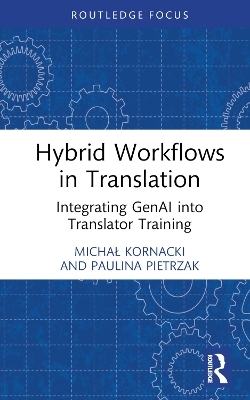
Hybrid Workflows in Translation
Routledge (Verlag)
978-1-032-86047-3 (ISBN)
- Noch nicht erschienen (ca. November 2024)
- Versandkostenfrei innerhalb Deutschlands
- Auch auf Rechnung
- Verfügbarkeit in der Filiale vor Ort prüfen
- Artikel merken
Michał Kornacki is Assistant Professor at the Institute of English Studies at the University of Łódź, Poland. Paulina Pietrzak is Associate Professor at the Institute of English Studies at the University of Łódź, Poland.
Contents
List of Figures
List of Tables
Introduction
References
Chapter 1: (R)evolution of translation technology
Overview of the chapter
1.1. History and evolution of translation tools
1.1.1. Machine translation
1.1.2. Computer-assisted translation (CAT) tools
1.1.3. Translation management systems
1.1.4. Writing assistants and checking tools
1.1.5. Generative artificial intelligence in translation
1.2. The Current state of translation technology
1.3. Stages of AI development
References
Chapter 2: Translator-AI interaction
Overview of the chapter
2.1. Augmented translation
2.2. Hybrid workflows in translation
2.3. The impact of technology on translator profession: new avenues and new anxieties
2.4. Ethical considerations in AI-assisted language service provision
References
Chapter 3: Translators as AI-assisted language specialists
Overview of the chapter
3.1. Translators’ new roles and status
3.2. Future translator expertise: what is missing?
3.3. Technical skills for hybrid workflows
3.4. From anxiety to digital resilience
3.5. Personal resources and metacognitive capacity
3.6. The translator’s self-concept in AI interactions
References
Chapter 4: Attitudes towards AI in translation: an academic exploration
Overview of the chapter
4.1. Research design
4.2. Limitations of the study
4.3. Data analysis
4.3.1. Findings on the use of AI technologies in translation
4.3.2. Perspectives on GenAI integration in translator education
4.3.3. Risks associated with using GenAI tools in translator training
4.4. Summary of the findings: challenges and lessons learned
References
Chapter 5. Implications for translator training
Overview of the chapter
5.1. To teach or not to teach?
5.2. What’s in it for translation students?
5.3. Suggested ways of introducing AI-assisted translation practice
5.3.1. Exercises in AI-assisted translation
5.3.2. AI tools for terminology management
5.3.3. AI-assisted quality assessment
5.3.4. AI-generated feedback
5.3.5. Ethical code of conduct in AI use
5.4. Fostering personal resources in translator training
5.4.1. Self-reflection: what am I missing?
5.4.2. Self-efficacy: building digital resilience
5.4.3. Self-concept: reducing technological anxiety
References
Chapter 6: Final reflections
Appendix
Index
| Erscheint lt. Verlag | 11.11.2024 |
|---|---|
| Reihe/Serie | Routledge Focus on Translation and Interpreting Studies |
| Zusatzinfo | 13 Tables, black and white; 12 Line drawings, black and white; 12 Illustrations, black and white |
| Verlagsort | London |
| Sprache | englisch |
| Maße | 138 x 216 mm |
| Themenwelt | Geisteswissenschaften ► Sprach- / Literaturwissenschaft ► Anglistik / Amerikanistik |
| Geisteswissenschaften ► Sprach- / Literaturwissenschaft ► Literaturwissenschaft | |
| Geisteswissenschaften ► Sprach- / Literaturwissenschaft ► Sprachwissenschaft | |
| Informatik ► Theorie / Studium ► Künstliche Intelligenz / Robotik | |
| ISBN-10 | 1-032-86047-2 / 1032860472 |
| ISBN-13 | 978-1-032-86047-3 / 9781032860473 |
| Zustand | Neuware |
| Haben Sie eine Frage zum Produkt? |
aus dem Bereich


